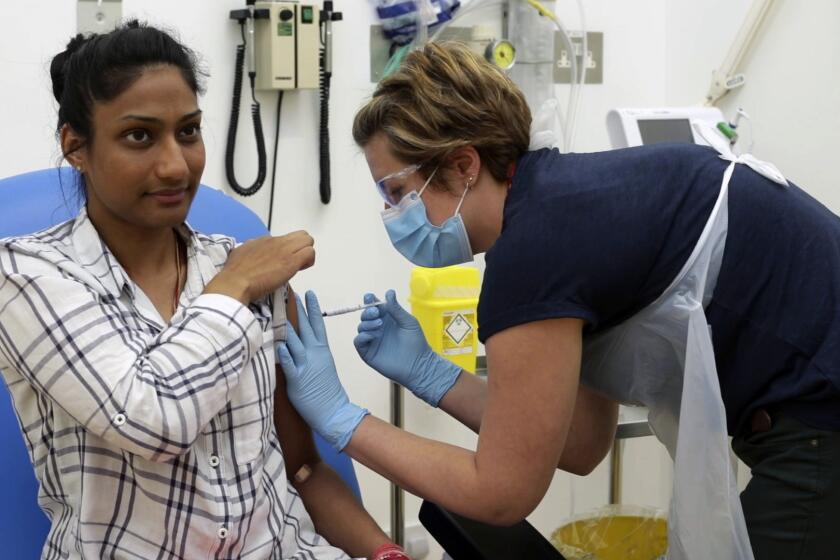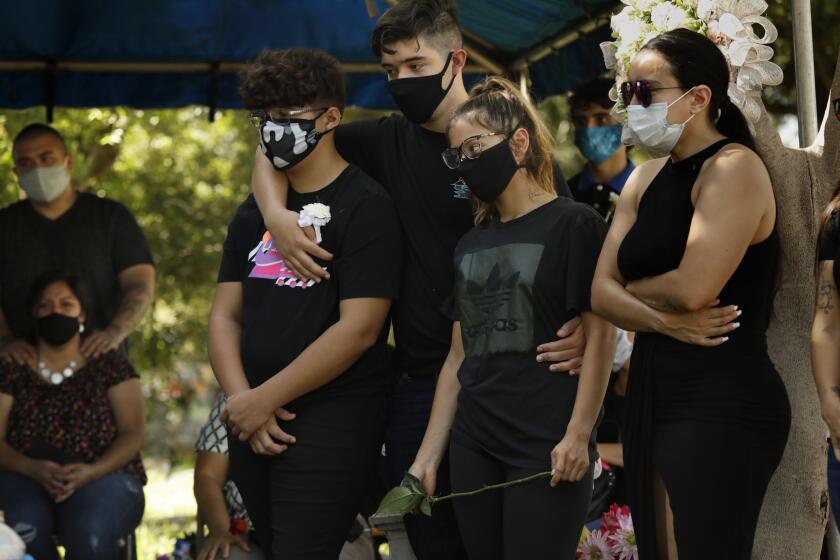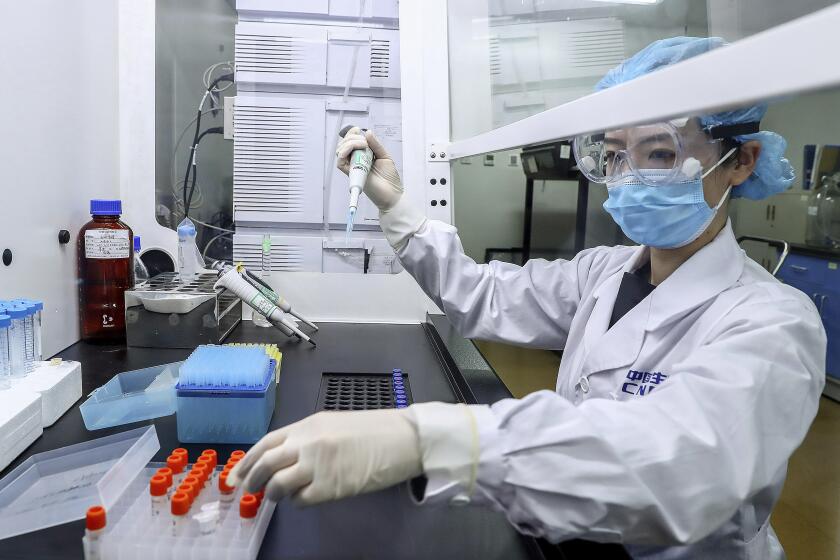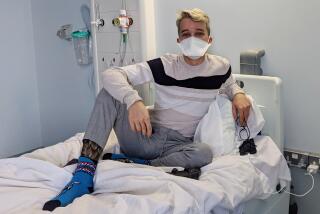Final test of Moderna’s coronavirus vaccine — in 30,000 volunteers — gets underway
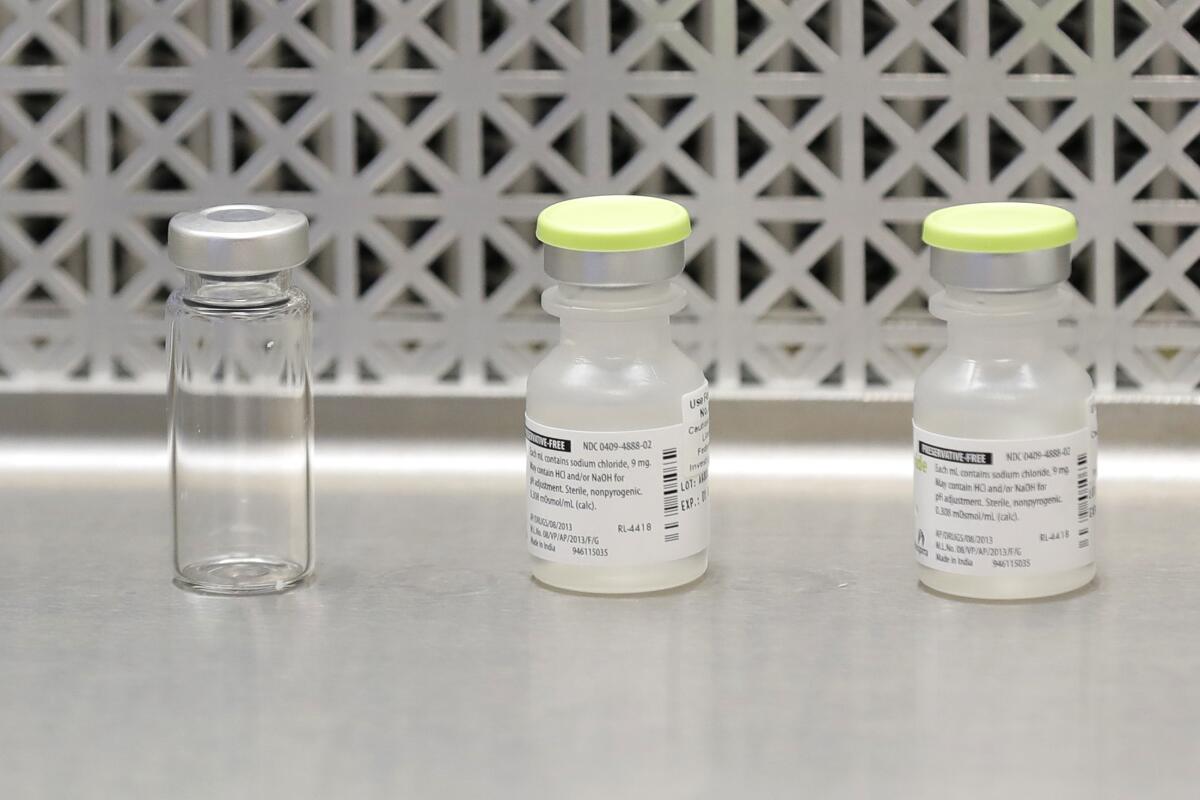
- Share via
The world’s biggest COVID-19 vaccine study got underway Monday with the first of 30,000 planned volunteers helping to test one of several candidates in the final stretch of the global vaccine race.
There’s still no guarantee that the experimental vaccine, developed by the National Institutes of Health and Moderna, will really protect against the disease caused by the coronavirus.
To help obtain proof, volunteers won’t know if they’re getting the real shot or a dummy version. After two doses, scientists will closely track which group experiences more infections as they go about their daily routines, especially in areas where the virus still is spreading unchecked.
“Unfortunately for the United States of America, we have plenty of infections right now” to get that answer, NIH’s Dr. Anthony Fauci recently told the Associated Press.
Moderna said the vaccination was done in Savannah, Ga., the first site to get underway among dozens of trial sites scattered around the country.
In Binghamton, N.Y., nurse Melissa Harting said she volunteered as a way “to do my part to help out.”
“I’m excited,” Harting said before she received a study injection Monday morning. Especially with family members in front-line jobs that could expose them to the virus, she said, “doing our part to eradicate it is very important to me.”
Can a coronavirus vaccine really be developed this year? Dr. Anthony Fauci and other experts say it’s possible but far from certain.
Several other vaccines made by China and by Britain’s Oxford University earlier this month began smaller final-stage tests in Brazil and other hard-hit countries.
But the U.S. requires its own tests of any vaccine that may be used in the country and has set a high bar: Every month through fall, the government-funded COVID-19 Prevention Network will roll out a new study of a leading candidate — each one with 30,000 newly recruited volunteers.
The massive studies aren’t just to test if the shots work; they’re needed to check each potential vaccine’s safety. And following the same study rules will let scientists eventually compare all the shots.
Next up in August, the final study of the Oxford shot begins, followed by plans to test a candidate from Johnson & Johnson in September and Novavax in October, if all goes according to schedule. Pfizer plans its own 30,000-person study this summer.
That’s a stunning number of people needed to roll up their sleeves for science. But in recent weeks, more than 150,000 Americans filled out an online registry signaling interest, said Dr. Larry Corey, a virologist with the Fred Hutchinson Cancer Research Institute in Seattle, who helps oversee the study sites.
Testing vaccines for the coronavirus raises tough ethical questions
“These trials need to be multi-generational, they need to be multi-ethnic, they need to reflect the diversity of the United States population,” Corey told a vaccine meeting last week. He stressed that it was especially important to ensure there were enough Black and Latino participants, as those populations are hard-hit by COVID-19.
It normally takes years to create a new vaccine from scratch, but scientists are setting speed records this time around, spurred by knowledge that vaccination is the world’s best hope against the pandemic. The coronavirus wasn’t even known to exist before late December, and vaccine makers sprang into action Jan. 10 when China shared the virus’ genetic sequence.
Just 65 days later in March, the NIH-made vaccine was tested in people. The first recipient is encouraging others to volunteer now.
“We all feel so helpless right now. There’s very little that we can do to combat this virus. And being able to participate in this trial has given me a sense ... that I’m doing something,” Jennifer Haller of Seattle said. “Be prepared for a lot of questions from your friends and family about how it’s going, and a lot of thank-yous.”
A Chinese company is boasting that its employees received doses of an experimental COVID-19 vaccine before the government approved testing in people.
The first-stage study that included Haller and 44 others showed that the shots revved up volunteers’ immune systems in ways scientists expected would be protective, with some minor side effects such as a brief fever, chills and pain at the injection site. Early testing of other leading candidates have had similarly encouraging results.
If everything goes right with the final studies, it still will take months for the first data to trickle in from the Moderna test, followed by the Oxford one.
Governments around the world are trying to stockpile millions of doses of those leading candidates so that, if and when regulators approve one or more vaccines, immunizations can begin immediately. But the first available doses will be rationed, presumably reserved for people at highest risk from the virus.
“We’re optimistic, cautiously optimistic,” that the vaccine will work and that “toward the end of the year” there will be data to prove it, Dr. Stephen Hoge, president of Massachusetts-based Moderna, told a House subcommittee last week.
Until then, Haller, the volunteer vaccinated back in March, wears a mask in public and takes the same distancing precautions advised for everyone, while hoping that one of the shots in the pipeline pans out.
“I don’t know what the chances are that this is the exact right vaccine,” she said. “But thank goodness that there are so many others out there battling this right now.”
More to Read
Sign up for Essential California
The most important California stories and recommendations in your inbox every morning.
You may occasionally receive promotional content from the Los Angeles Times.
